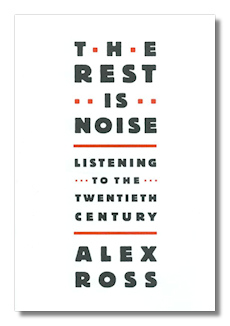
The Internet's Premier Classical Music Source
Related Links
-
Introduction
Acoustics
Ballet
Biographies
Chamber Music
Composers & Composition
Conducting
Criticism & Commentary
Discographies & CD Guides
Fiction
History
Humor
Illustrations & Photos
Instrumental
Lieder
Music Appreciation
Music Education
Music Industry
Music and the Mind
Opera
Orchestration
Reference Works
Scores
Thematic Indices
Theory & Analysis
Vocal Technique
Search Amazon
Recommended Links
Site News
 Book Review
Book Review
The Rest is Noise

Listening to the Twentieth Century
Alex Ross
New York: Farrar, Straus and Giroux, 2007
Hardcover. 624 pp
ISBN-10: 0374249393
ISBN-13: 978-0374249397
Alex Ross, the music critic of The New Yorker, presents a highly researched and documented history of 20th century classical music. Beginning with a performance of Salome, in Graz, the attendees of which included Mahler, Schoenberg, Berg, Puccini, and perhaps Hitler, he brings his historical account up to John Adams. His stated aim is to give an account of the "cultural predicament of the composer in the twentieth century," and thus the social and political conditions in which composers lived. To this end he devotes chapters to Berlin in the 20s, music in Stalin's Russia, FDR's U.S. and Hitler's Germany. He tends to focus on representative figures from various times and places, whom he makes vivid and real, rather than give balanced accounts of other composers. To be sure, it would be impossible to do justice to all the significant composers of the past century, even in such a lengthy book. He says quite a lot about Strauss, Schoenberg, Messiaen and the minimalists, little about Ravel, nothing about William Schuman, a bare mention of Rochberg, a line about Shapero (his early interest in jazz, not his symphony). Strauss comes off rather badly in his account; Orff rather better: Carmina Burana was dismissed with an offensively racist epithet by a Nazi reviewer when it first appeared, though when it became popular the Nazi aesthetic was modified to accommodate that fact. Orff's School Work project, Ross says, "probably touched more lives than any music described in this book."
For me, the most interesting chapters come in the middle of the book. In mid-20th century, when the Cold War was beginning and Germany was widely in ruins, some thought that musical tonality was largely destroyed as well. Less well known than these events, and news to me, is that there was a significant connection among these matters. Ross relates that both denazification and Cold War politics included financial assistance to atonal composers, initially at Darmstadt, and later, through funds covertly provided by the CIA, even for such commissions as the one Stravinsky received for Threni.
In the U.S., the end of the New Deal support for the arts was followed by official encouragement for Darmstadt atonality. "Uncompromising" standards were framed in terms of Western freedom of expression versus Stalinist socialist realism. At first this was an attempt by American occupation forces to change German musical taste; they encouraged jazz and works forbidden by the Nazis, notably Mendelssohn at first. They actively discouraged performances of the still-living Richard Strauss. I was surprised to see Ross, in a late chapter, permit himself to say that "uptown" (Lincoln Center) audiences enjoyed some of Hitler's favorite works. Sixty years after Hitler's death some German pundits could still be heard declaring that use of triads showed a fascist mentality. The German musical establishment opposed minimalism in any form.
I would be hard pressed to pin down Ross' own aesthetics. As a detached observer, he nearly always avoids any evaluative terms in reference to the music he discusses. At one pole, he devotes whole chapters to Sibelius and Britten. He also describes particular chords that many composers use. At the other pole, he quotes the extreme views of some avant-gardists to the degree that suggests a middle of the road viewpoint. He reports that Adorno, in Philosophy of New Music, proposed destroying tonality and neoclassicism, which were "symptoms of the Fascist personality." Adorno also "decreed" that the work of the composer was to write music that would repel, shock and be the vehicle of "unmitigated cruelty." Rene Leibowitz wrote a book called Sibelius, the Worst Composer in the World, and strongly influenced the direction that the Darmstadt composers took. Boulez was even more nasty and condescending to composers whose music he did not like than I had been aware of. But Ross shows no interest in the expressive aspects of music and very limited interest in neoclassicism or neoromanticism. His treatment of the avant-garde in the early part of the century is limited, but he spends a great deal of space on the twelve-tone and serialist composers, as well as the minimalists.
Benjamin Britten "provocatively compared the regimentation of culture in totalitarian states to the self-imposed regimentation in democratic countries." The uncompromising standards of some composers, such as Carter and Babbitt led to works of enormous complexity. Their disdain for popularity led to some statements close to aesthetic solipsism, Carter saying "to hell with the public and the performers too." Babbitt's article, entitled by its editor "Who Cares if You Listen" is well known.
Much of the material Ross covers is well known. But his extensive research, evidenced by nearly a hundred columns of documentation in small type, has turned up a great deal that I at least did not know. And his description of the music of at least one composer I never paid attention to, Morton Feldman, has aroused my interest. His book is well written and well worth reading. There are some photos and an index.
Copyright © 2008 by R. James Tobin



















